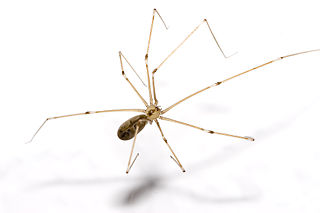
The Pholcidae are a family of araneomorph spiders. The family contains over 1,800 pholcids, including those commonly known as the marbled cellar spider , daddy long-legs spider, granddaddy long-legs spider, carpenter spider, daddy long-legger, vibrating spider, gyrating spider, long daddy, and skull spider. The family, first described by Carl Ludwig Koch in 1850, is divided into 94 genera.
Commoris is a genus of Caribbean jumping spiders that was first described by Eugène Louis Simon in 1902. As of June 2019 it contains only two species, found only in Dominica and on Guadeloupe: C. enoplognatha and C. minor.

Enoplognatha is a genus of comb-footed spiders that was first described by P. Pavesi in 1880. They have both a large colulus and a subspherical abdomen. Males usually have enlarged chelicerae. It is considered a senior synonym of Symopagia.

Rugathodes is a genus of comb-footed spiders that was first described by Allan Frost Archer in 1950. It is closely related to members of Theridion and Wamba.

Enoplognatha ovata is a species of spiders belonging to the family Theridiidae.

Enoplognatha thoracica is a spider species with Holarctic distribution. It is notably found in Lithuania.
Enoplognatha oreophila, is a species of spider of the genus Enoplognatha. It is endemic to Sri Lanka.

Phylloneta is a genus of comb-footed spiders formerly considered a sub-genus of Allotheridion, and raised to genus status in 2008. The type species was first described by Eugen von Keyserling in 1884 as Theridion pictipes. As of September 2019 it contains three species and two subspecies with a holarctic distribution: P. impressa, P. pictipes, P. sisyphia, P. s. foliifera, and P. s. torandae.
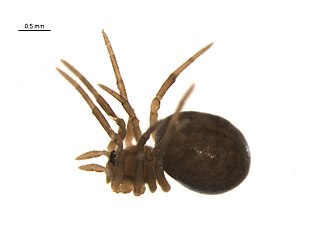
Enoplognatha intrepida is a spider in the family Theridiidae, in the infraorder Araneomorphae . The distribution range of Enoplognatha intrepida includes the USA, Canada, Greenland, and Korea.

Enoplognatha caricis is a species of cobweb spider in the family Theridiidae. It is found in Europe, Turkey, a range within Russia, China, Korea, and Japan.
Enoplognatha marmorata, the marbled cobweb spider, is a species of cobweb spider in the family Theridiidae. It is found in North America.
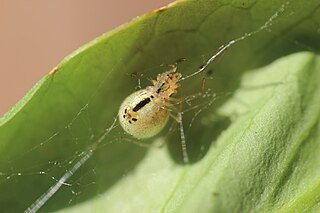
Enoplognatha latimana is a species of cobweb spider in the family Theridiidae. It is found in Canada, Europe, North Africa, Turkey, Caucasus, and Central Asia.
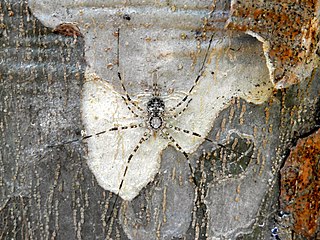
Neotama mexicana, also known as the long-spinneret spider or Mexican two-tailed spider, is a species of tree trunk spider in the family Hersiliidae. It is found in a range from the United States to Peru and Guyana.

Hentzia mitrata, the white-jawed jumping spider, is a species of jumping spider in the family Salticidae. It is found in the United States, Canada, and Bahama Islands.
Pityohyphantes costatus, the hammock spider, is a species of sheetweb spider in the family Linyphiidae. It is found in the United States.
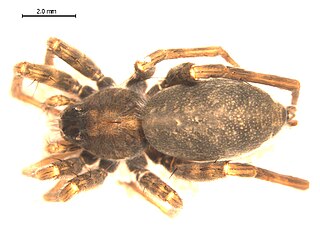
Pardosa lapidicina, the stone spider, is a species of wolf spider in the family Lycosidae. It is found in the United States and Canada.
Xysticus emertoni, or Emerton's crab spider, is a species of crab spider in the family Thomisidae. It is found in the United States, Canada, Slovakia, Russia, and a range from Central Asia to China.

Pirata piraticus is a species of wolf spider in the family Lycosidae. It is found in North America, Europe, Turkey, Caucasus, a range from Russia, Central Asia, China, and Japan.
Phrurotimpus borealis is a species of true spider in the family Phrurolithidae. It is found in North America.
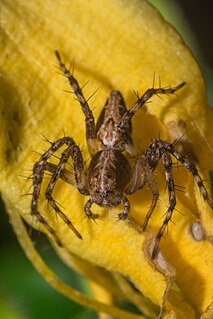
Oxyopes scalaris, the western lynx spider, is a species of lynx spider in the family Oxyopidae. It is found in North America.













